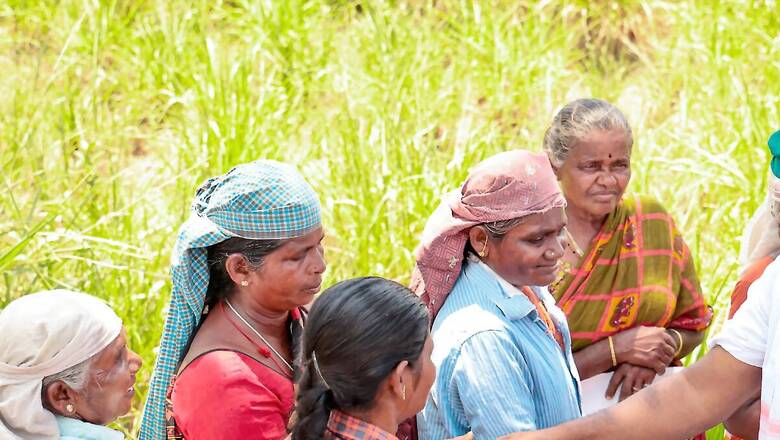
views
Centre’s face authentication system, a new feature in the works to mark the attendance of workers employed under its flagship Mahatma Gandhi National Rural Employment Guarantee Scheme (MGNREGS), is in the testing phase and is likely to be rolled out soon this year, even as several districts across states are yet to train their field functionaries for the same, News18 has learnt.
The union government had last year announced that it plans to launch the face recognition feature in 2024 to plug leakages in the scheme and had run a pilot in Tohana block in Haryana’s Fatehabad district last October. The feature is to be integrated in the already functional National Mobile Monitoring System (NMMS) application.
Officials in the Haryana rural development department said that the pilot was done in Tohana’s Dangra village on October 10 last year where officials from the Ministry of Rural Development (MoRD) had come down for the testing.
While the facial recognition feature was being used in the district few months post the trial, it is not in use at present.
“After a successful trial, the face authentication feature was being used across most districts to mark the attendance for three to four months duration, but after that, due to some technical issue, it is not in use currently,” said an official in the Haryana rural development department.
The ministry had last December told states to prepare for the implementation of the face authentication system. While it had asked states to start testing the feature and report if there were issues on the ground, many are yet to get a word on the training of field staff, and some are getting aware of the new feature being introduced only now.
Face authentication under MGNREGS is a system that uses real-time face recognition of workers to verify their attendance. The feature in the app scans the face of workers at a given worksite to match it against their Aadhaar data stored with the Unique Identification Authority of India (UIDAI). Once the data is matched, it is integrated with the MGNREGS portal. After this, whenever workers report to a worksite, only their faces need to be scanned.
When a mate (field functionaries who mark the attendance) clicks on the job card number of a worker on the app, the option for e-authentication opens, which then scans the worker’s face.
However, officials said, so far, the government plans to keep this feature optional and workers can still mark their attendance manually on the app. “Around five percent workers had an issue with scanning their faces during the pilot run, whose attendance was marked manually on the app,” the official said.
Introducing this new feature is intended to further weed out duplication and ghost beneficiaries and reduce financial irregularities in the rural employment scheme through streamlining the process of marking attendance and thereby ensuring greater transparency in the system.
To plug leakages, the Centre had first made digital capturing of workers’ attendance through the NMMS app mandatory under MGNREGS starting January 1, 2023.
Several issues such as poor internet connectivity in several rural pockets, non-availability of compatible smartphones and frequent glitches in the app resulting in workers losing out on their pay due to attendance not being marked were reported soon after the app was rolled out. It also led to protests with workers and MGNREGS activists demanding a rollback of the app, which they said, was done without enough testing and available digital infrastructure.
States yet to start groundwork
Officials implementing the scheme in villages across several states said that though the NMMS app is much smoother currently, some issues do crop up randomly and that there are still some pockets where low internet connectivity makes it difficult to use the app effectively.
In Rajasthan, state department officials said, a pilot was done this August across districts at the block level. “A trial has been done, but proper training of field staff is still required. The government plans to roll it out across states in one go, but it might be difficult that way and must be done in phases for effective implementation,” said a senior official in the state’s rural department.
A senior rural development official in Bihar said that training of field officers for implementation of face authentication is scheduled October 16.
“Training for all field officers across districts will be held at Patna, the state headquarters. The ministry has made several presentations on how the feature works,” said the official in Bihar government’s rural development department.
Several districts in Uttar Pradesh are yet to receive a formal intimation on training for the same. “We are yet to get any official word for training staff. The NMMS app is used to mark attendance,” said an official in the state department.
‘New feature to improve credibility’
According to ministry officials, deployment of face authentication is in the testing phase.
“Pilot testing has been done with the field functionaries. The face authentication system helps in improving credibility since issue of duplication would still occur at times even with the digital attendance system where workers photographs uploaded on the app are not clear,” a ministry official said.
As testing is ongoing, specific timeline for rollout will be communicated to states in due course.
The MoRD will issue a Standard Operating Procedure (SoP) of face authentication with the states before implementing the same, the ministry official said.
“To ease out hurdles in implementation, a practice app has already been developed and successfully tested by the field officials. A practice video of face authentication also has already been shared to the states during testing period,” the official added.
However, just like with the NMMS, activists working closely with MGNREGS workers have raised concerns on the government introducing another digital feature.
Social activist Nikhil Dey, member of the NREGA Sangharsh Morcha, said that there are still issues with the NMMS app and before it settles down, the government is again set to introduce another digital feature without running proper pilots to know the efficacy of the application or even enough infrastructure including upgraded smartphones and better internet connectivity.
“The ministry must make the reports of the pilots run public. The trials need to be conducted in a sustained manner with feedback taken from all stakeholders. There is a need for much better digital infrastructure across villages to roll out a new feature at such a mass level. At present it’s being said that the feature will be optional, but in due course of time, it will become another way of excluding workers from the scheme on its pretext just like what happened earlier,” he said.



















Comments
0 comment